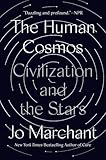The Human Cosmos : Civilization and The Stars
Material type: TextPublication details: New York : Dutton, Penguin Random House LLC, 2020Description: xii, 386 pages ; 24 cmISBN:
TextPublication details: New York : Dutton, Penguin Random House LLC, 2020Description: xii, 386 pages ; 24 cmISBN: - 9780593183045
- QB981
| Item type | Current library | Collection | Shelving location | Call number | Status | Date due | Barcode | Item holds | |
|---|---|---|---|---|---|---|---|---|---|
| Books | Asian University for Women Library | Non-fiction | General Stacks | QB981 (Browse shelf(Opens below)) | Available | 030951 |
Browsing Asian University for Women Library shelves, Shelving location: General Stacks, Collection: Non-fiction Close shelf browser (Hides shelf browser)

|

|

|

|

|

|

|
||
| QA300.H328 Introductory Mathematical Analysis for Business, Economics, and The Life and Social Sciences | QA303.2.W45 Thomas' Calculus Early Transcendentals | QA433. S66 Vector analysis | QB981 The Human Cosmos : Civilization and The Stars | QC16.F49A37 "Surely You're Joking, Mr. Feynman!": Adventures Of A Curious Character | QC21.3 .H35 Physics. | QC30.M345 Peer Instruction : A User's Manual |
An historically unprecedented disconnect between humanity and the heavens has opened. Jo Marchant's book can begin to heal it. For at least 20,000 years, we have led not just an earthly existence but a cosmic one. Celestial cycles drove every aspect of our daily lives. Our innate relationship with the stars shaped who we are--our art, religious beliefs, social status, scientific advances, and even our biology. But over the last few centuries we have separated ourselves from the universe that surrounds us. It's a disconnect with a dire cost. Our relationship to the stars and planets has moved from one of awe, wonder and superstition to one where technology is king--the cosmos is now explored through data on our screens, not by the naked eye observing the natural world. Indeed, in most countries modern light pollution obscures much of the night sky from view. Jo Marchant's spellbinding parade of the ways different cultures celebrated the majesty and mysteries of the night sky is a journey to the most awe inspiring view you can ever see--looking up on a clear dark night. That experience and the thoughts it has engendered have radically shaped human civilization across millennia. The cosmos is the source of our greatest creativity in art, in science, in life. To show us how, Jo Marchant takes us to the Hall of the Bulls in the caves at Lascaux in France, and to the summer solstice at a 5,000-year-old tomb at New Grange in England. We discover Chumash cosmology and visit medieval monks grappling with the nature of time and Tahitian sailors navigating by the stars. We discover how light reveals the chemical composition of the sun, and we are with Einstein as he works out that space and time are one and the same. A four-billion-year-old meteor inspires a search for extraterrestrial life. The cosmically liberating, summary revelation is that star-gazing made us human.
There are no comments on this title.
